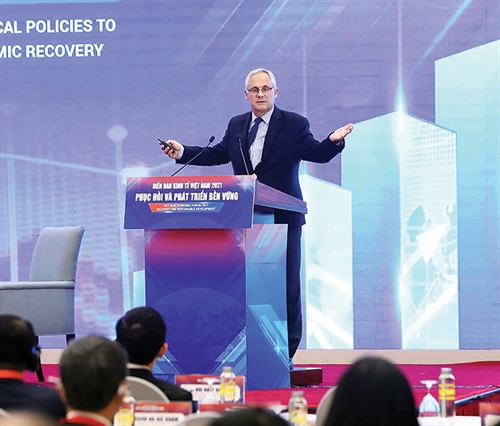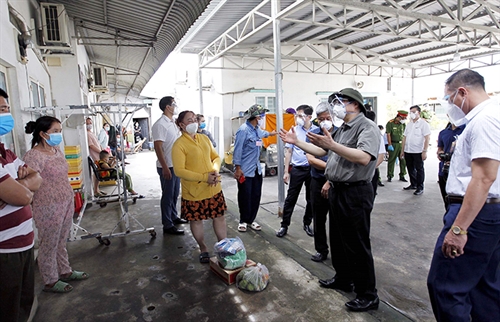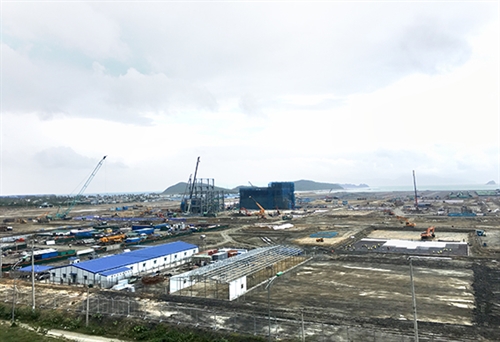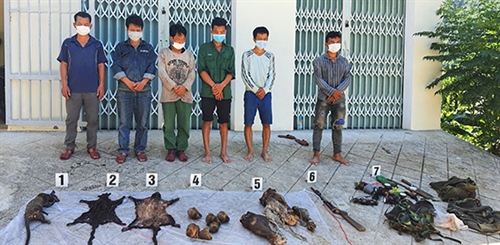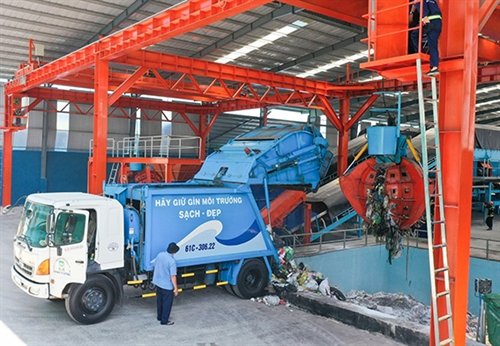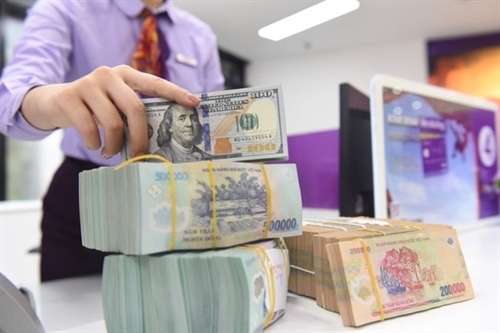The current constitutional defense mechanism has revealed many limitations, making it operate irregularly with low quality and effect. The principle of ensuring the Constitution’s supremacy in the law-ruled state has not been fully realized due to the existence of unconstitutional legal documents and acts. This article analyzes requirements and gives some recommendations for strengthening this mechanism.
Associate Prof. Dr. Tao Thi Quyen[1] and Ha Hai Binh[2]
Requirements on the constitutional defense mechanism in the spirit of the Party’s Resolution
The constitutional defense mechanism is composed of closely inter-related and interacted elements forming a system which operates to defend the Constitution and prevent and handle all violations.
The constitutional defense mechanism in Vietnam reflects the nature of its law-ruled socialist state, not only aligning with the principles on organization and operation of the Socialist Republic of Vietnam but also upholding the universal values of constitutional defense in a law-ruled state. The consolidation of the socialist law-ruled state in Vietnam in the spirit of the 13th National Party Congress’s Resolution poses the following requirements on the constitutional defense mechanism:
First, to ensure the specialization and relative independence of the constitutional defense institution
A constitutional defense institution is key to the constitutional defense mechanism. To enable this mechanism to operate effectively, such institution must hold a position that is independent from other bodies in the state apparatus, and operate with its own functions and tasks.
Defending the Constitution is a special legal and political activity as seen in its special purpose and contents. As compared to general law enforcement activities, constitutional defense is much more noble and profound, aiming to protect the people’s sovereignty, the political regime of the nation, the legal foundation of the State and the everlasting and noble values in society. The contents of constitutional defense cover not only activities of merely legal nature but also activities of political nature. Hence, in order to carry out such activities, the constitutional defense body must be relatively independent from other agencies performing the legislative, executive and judicial powers. “The emergence of an independent constitutional defense institution in Vietnam will undoubtedly contribute to heightening the sense of respect for the Constitution and law of both the State and citizens, and the human rights as well as civic rights recognized and protected by the Constitution will see a new substantial progress”[3].
Second, to ensure the synchronism, consistency and clarity of the constitutional defense institution
The constitutional defense system in Vietnam’s socialist law-ruled state is composed of synchronous and unified principles and norms dictating the objectives and orientations and establishing legal bases for building and operating the constitutional defense mechanism.
The 2013 Constitution provides in Article 2.1: “The State of the Socialist Republic of Vietnam is a socialist state, ruled by law, and of the People, by the People and for the People”. This lays down the primary guiding principle on the law-ruled state and the constitutional defense mechanism in the country. Thereby, the Constitution has identified other important principles orientating and governing the organization of the State’s activities in general and constitutional defense activities in particular. These principles include “the state power belongs to the People” (Article 2.2); organization and operation under the Constitution and law, ensuring the supreme effect of the Constitution (Article 119); respecting, guaranteeing and protecting human rights and citizens’ rights (Article 14); and “the state power is unified and delegated to state agencies which coordinate with and control one another in the exercise of the legislative, executive and judicial powers” (Article 2.3). These political and legal principles play an absolutely important role in the constitutional defense institution, orientating the objectives of constitutional defense activities and directing the contents as well as modes of demonstrating other provisions in the Constitution and legal documents on constitutional defense.
To regulate the legal relations arising in the course of carrying out constitutional defense activities, a legal text defining the constitutional defense mechanism is needed. Article 119.2 of the 2013 Constitution provides: “The mechanism to defend the Constitution shall be prescribed by a law”. Such law should institutionalize and concretize the constitutional principles and provisions regarding this mechanism. It should deal with comprehensive matters as contents of constitutional defense activities; the functions and powers of the constitutional defense institution, the way of its establishment and its organizational structure; subjects liable to constitutionality scrutiny; methods, forms and procedures for carrying out constitutional defense activities; and legal measures to be imposed by the constitutional defense institution on constitution violators.
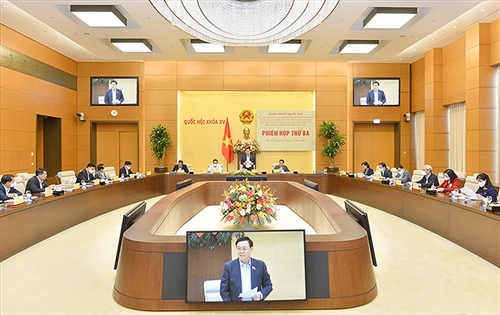 |
| NA Chairman Vuong Dinh Hue addresses at a working session of the NA’s Party Committee on constitutional defense__Photo: VNA |
Third, the operation mode of the constitutional defense mechanism must suit the nature, functions, tasks and jurisdiction of the constitutional defense institution
Constitution defense activities should be carried out in a special mode aiming to achieve the purpose of defending the Constitution, demonstrating the special important role of the constitutional defense mechanism in Vietnam. That mode must also conform to the position, nature, function, tasks and jurisdiction of the constitutional defense body. Moreover, as unconstitutional acts are likely to be committed by public authorities, the applicable penalties should involve legal and political liabilities.
The mode of operating the constitutional defense mechanism should be specifically demonstrated through forms, methods, processes and procedures of carrying out constitution defense activities. For activities of declaring and handling unconstitutional documents in conformity with the constitutional jurisdiction nature and the ambit of jurisdiction of the constitution defense body, the constitution defense mode should be effected by a special method of prosecution. If the constitutional defense body concludes on the unconstitutionality of a document, it would declare such documents invalid. But depending on the legal effect of each type of document, the constitution defense body may decide whether to cancel it or not.
Fourth, the constitutional defense mechanism complies with the principle of unified state power with division, coordination and control among the state agencies in the exercise of the state power
The principle of unified power is a peculiarity of the Vietnamese socialist law-ruled state. The constitutional defense mechanism is a part of the state power organization and exercise mechanism and an important element to guarantee the unity of the state power. Through activities of resolving disputes and handling unconstitutional acts in the exercise of state power, and correcting errors and deviations that threaten the political regime and national sovereignty, the constitutional defense mechanism greatly contributes to securing the unified state power.
However, it should be of one mind that “the unified power does not mean the concentration of power into one supreme point (because there exists the division of power among the legislative, executive and judicial branches as enshrined in Article 2 of the Constitution) but only means that the power branches should coordinate with one another and must not basically contradict one another, thus leading to the destruction or disruption of power”[4]. The constitution defense body is delegated by the people to undertake the specialized function of defending the Constitution. The constitutional defense institution participates in the exercise of state power under the people’s delegation as demonstrated in the constitutional provisions. In addition to the control among the National Assembly, the Government, the Supreme People’s Court and the Supreme People’s Procuracy, there exists in the Vietnamese socialist law-ruled state a specialized constitution defense body controlling the above-named agencies. The constitution defense mechanism is an effective tool to control the state agencies exercising the legislative, executive and judicial powers but its ultimate goal is not to cause conflicts and difficulties to legislative, executive and judicial activities. It has the effect of preventing the abuse of power or the non-fulfillment of tasks and powers delegated to the state agencies. If the abuse of power or non-fulfillment of competence prescribed by the Constitution takes place, the constitutional defense body is entitled to make a decision, determine the constitutional responsibility and apply certain punitive measures. So, the constitutional defense mechanism guarantees the constitutionality of legislative, executive and judicial activities, ensuring that the state agencies properly and fully perform the tasks and powers prescribed by the Constitution.
The coordination between the constitutional defense body and other agencies in the state apparatus means that such agencies as the National Assembly, the Government, and the President can participate in constitutional defense activities through requesting the examination of the constitutionality of legal documents, interpretation of the Constitution, thus helping the legislative, executive and judicial agencies better perform their functions.
Fifth, to ensure the constitutional leadership of the Communist Party over the constitutional defense mechanism
As a component in the state power apparatus in Vietnam, the constitutional defense mechanism must be placed under the constitutional leadership of the Communist Party of Vietnam. Such leadership is manifest first of all in that the Party’s documents and resolutions set forth the guiding viewpoints on constitutional defense activities and the building and improvement of the constitutional defense mechanism. For instance, the Document of the 10th National Party Congress stated: “To determine the constitutional defense mechanism, clearly defining the mechanism and mode to guarantee the supremacy of the Constitution…; to study the formulation of mechanisms to declare constitutional violations in legislative, executive and judicial activities”[5]. The 11th National Party Congress emphasized the task: “To continue building and step by step improving the mechanism to examine and oversee the constitutionality and legality in activities and decisions of the state-power agencies”[6]. Recently, at its 13th Congress, the Party set the task: “To perfect the constitutional defense mechanism”[7]. The above-said viewpoints guide and comprehensively direct the development of the components of the constitutional defense institution, the constitutional defense body and the modes of defending the Constitution to guarantee that the constitutional defense mechanism operates fruitfully in conformity with the distinctive features of Vietnam’s socialist law-ruled state.
Solutions to materialize the Party’s resolution on strengthening the constitutional defense mechanism
Since the 2013 Constitution was enforced, the operation of the constitutional defense mechanism has attained certain results. However, the current constitutional defense mechanism still reveals many limitations. To name but a few, the constitutional defense institution remains scattered, coincident and unsystematic, without clear and strict legal bases for constitutional defense activities. Without a dedicated constitutional defense body, the constitutional defense jurisdiction is delegated to various agencies and individuals with improper division and unclear responsibility. Many agencies have failed to properly and fully perform their assigned functions and tasks. The constitution defense regulations are still of low effect. The components of the constitutional defense mechanism are not synchronous. The operation of the constitutional defense mechanism has been irregular and inefficient. In reality, many unconstitutional acts have not been promptly detected and stopped.
In order to enhance the constitutional defense, the need to improve the constitutional defense mechanism has been identified at the 13th National Party Congress: “To continue building and perfecting the socialist law-ruled state led by the Party is the central task of the renewal of political system, perfecting the constitutional defense mechanism”[8].
To materialize the above-said guidelines, the following solutions should be applied:
Enhancing the education about the Constitution, raising the awareness about the role and nature of the Constitution as well as the constitutional defense mechanism
Although great change has been seen in the people’s, cadres’ and civil servants’ understanding of the position and role of the Constitution in the social life, there still exist incorrect, inadequate or obsolete ideas of the Constitution. Professor, Doctor Dao Tri Uc wrote: “Legally, the Constitution is a fundamental law and a politico-legal document of the highest position in the legal system. However, in reality a clearer and more complete perception of the direct effect of the Constitution has not yet been seen in the thinking and action of citizens as well as public employees”[9].
Some people still think that the Constitution, albeit the most important politico-legal document of the nation, is mainly as a symbol orientating the entire society rather than as a substantive law with direct impacts on life. Some others consider the Constitution as a product of the State, created by the State, with little importance being attached to reflecting the people’s will and the objectiveness of the Constitution. On the other hand, a number of agencies, organizations, cadres and civil servants in the course of exercising the state power, have not yet given prominence to the supremacy of the Constitution. Such incomplete perception of the Constitution has led to the one-sided and outmoded perception of the role, contents and structure of the constitutional defense mechanism. This has exerted negative impacts on the process of perfecting the constitutional defense mechanism, failing to meet the requirements of national development in the new period.
Therefore, renewing legal thinking of the Constitution is an important measure to ensure respect for, enforcement and defense of the Constitution in Vietnam today. To this end, we should continue propagating and educating on the Constitution, raising the people’s awareness of its true position and role. Professor, Doctor Dao Tri Uc wrote: “The democracy’s demand, the people’s aspiration and generally the principle of rule by law require the Constitution be applied directly. Hence, its provisions must satisfy the requirements of direct application and ensure the correct interpretation”[10]. In the socialist law-ruled state, the Constitution is not only a political document but also the basic substantive law containing norms that can be applied directly.
Such proper perception of the Constitution serves as a prerequisite for the objective, comprehensive and progressive perception of the constitutional defense mechanism, which is composed of various elements including implementation institution, principles, legal provisions, operation modes, assurance of material bases and legal sense as well as culture, operating under general principles to ensure the respect for and enforcement of the Constitution, and the handling of all unconstitutional acts. In the constitutional defense mechanism, the organization of the enforcement institution is the most important issue. The correct thinking of the especially important significance of the enforcement institution in the constitutional defense mechanism will create conditions for the establishment of a Constitutional defense institution model suitable to the socio-economic conditions and the nature of the state, the standpoint on organization of the state apparatus, the legal and cultural traditions of the nation, thereby establishing legal bases, the principles and proper modes of operation of the constitutional defense mechanism.
Further improving and implementing the constitutional defense regulations of the National Assembly and National Assembly bodies according to the 2013 Constitution
It should be reiterated that the National Assembly has the power to perform the “supreme oversight over the enforcement of the Constitution” while its Standing Committee oversees the enforcement of the Constitution. Here, the National Assembly Standing Committee’s oversight is understood as overseeing activities to support the National Assembly’s supreme oversight at the National Assembly’s sessions. In nature, such overseeing activities aim to provide data, evidences and grounds for the supreme oversight of the National Assembly. The legal consequence of oversight activities of the National Assembly Standing Committee only leads to the suspension of the implementation of unconstitutional documents while the legal consequence of the National Assembly’s supreme oversight means the cancellation of such documents.
The organization and operation of the National Assembly and its bodies should be further improved to effectively oversee the Constitution enforcement as well as the constitutionality of legal documents.
Upon considering the constitutionality of legal documents, the crux is to compare their contents, forms and promulgating jurisdiction with the constitutional provisions. Hence, the clear and adequate “standards” are required for the document-examining subjects’ comparison and analysis in order to come up with accurate and objective assessments and conclusions.
The National Assembly Standing Committee’s interpretation of the Constitution must comply with the following principles: (i) to adhere to the spirit, purposes, requirements and guiding viewpoints of the Constitution promulgation; (ii) to comply with the contents and language of the Constitution; and (iii) not to make amendments, supplementations or new provisions.
Regarding the order and procedures for interpretation of the Constitution, depending on the nature and contents of matters to be interpreted, the National Assembly Standing Committee should assign the Government, the Supreme People’s Court, the Supreme People’s Procuracy, the Ethnic Council and/or Committees of the National Assembly to draft resolutions on constitutional interpretation; the Ethnic Council or Committees of the National Assembly should verify such draft resolutions’ conformity with the spirit and contents of the Constitution; then the National Assembly Standing Committee would consider and pass the draft resolutions.
Organizing the implementation of the President’s regulations on constitutional defense
According to Article 88.1 of the 2013 Constitution, the President is empowered to request the National Assembly Standing Committee to reconsider the constitutionality of its ordinances. For the President to carry out this activity, it is necessary to renew and raise the quality of activities assisting the President; to enhance the staff and heighten the quality of cadres and civil servants at the President Office; and to professionalize activities of advising the President in the examination of the constitutionality of ordinances.
Detailing and implementing the Government’s regulations on constitutional defense
For the Government to well perform the examination of the constitutionality of laws and regulations, attention should be paid to the following matters:
Time limits for self-examination and examination of the constitutionality of legal documents according to competence
It is necessary to clearly set the time limits and determine the responsibility to conduct self-examinations within five and 10 days (after the documents are signed for promulgation). If legal documents are detected to contain signs of contravening the Constitution, they must be immediately dealt with. In case of detecting no unconstitutional signs in legal documents, the promulgating bodies must forward the documents together with the self-examination results to competent bodies for examination. Competent bodies must examine the documents within 30-40 days before they take effect, depending on the nature and complexity of the documents without waiting for their validity.
Forms of handling unconstitutional documents in conformity with the 2013 Constitution.
The form of total or partial implementation suspension and the form of total or partial cancellation of unconstitutional document should be clearly defined. Accordingly, the form of total or partial implementation suspension of documents should apply to cases where the unconstitutional contents are not yet amended, supplemented or promptly disregarded, and their continued implementation may cause serious consequences, affecting the interests of the State, legitimate rights and interests of organizations and/or individuals.
Regarding the time limits for handling unconstitutional documents, it should be specified that after clearly determining their unconstitutionality or the documents show signs of unconstitutionality, the documents must be promptly suspended from implementation within two working days (except cases in which the continued implementation may cause serious consequences, the immediate suspension is required). Within 10 working days after the suspension, the amendment, supplementation or cancellation of such unconstitutional documents must be considered according to regulations.
Implementing the regulations on responsibility of the People’s Courts and the People’s Procuracies to defend the Constitution
Article 2.2 of the Law on Organization of the People’s Courts should be amended as follows: “The People’s Courts have the task to defend the Constitution, to defend justice, to protect the human rights and citizens’ rights, to defend the socialist regime…”
During its hearings, the Courts should attach importance to discovering and proposing competent bodies to revise or cancel legal documents contrary to the Constitution, laws, resolutions of the National Assembly, ordinances and/or resolutions of the National Assembly Standing Committee in order to ensure the legitimate rights and interests of individuals, agencies or organizations.
With regard to the Law on Organization of People’s Procuracies, the following provision should be added: “ In the course of exercising the right to prosecution and procuring the judicial activities, the Procuracies shall detect and propose competent bodies to amend, supplement or cancel legal documents contrary to the Constitution, laws, resolutions of the National Assembly, ordinances and/or resolutions of the National Assembly Standing Committee in order to ensure the legitimate rights and interests of individuals, agencies and/or organizations”.
Studying the formation of a constitutional defense law
Article 119.2 of the 2013 Constitution provides: “The mechanism to defend the Constitution shall be prescribed by a law”. To institutionalize such provision, a Law on Defense of the Constitution should define the organization and operation of the specialized constitutional defense institution, probably called the Constitution Oversight Committee. It should be set up by the National Assembly, functioning to oversee the enforcement of the Constitution by the National Assembly, the National Assembly Standing Committee, the President, the Government, the Prime Minister, the Supreme People’s Court, and the Supreme People’s Procuracy.
As a special committee functioning to defend the Constitution, the organizational structure and operation of the Constitution Oversight Committee should bear specific characteristics, possibly different from professional bodies of the National Assembly. To us, the Committee should have a legal position like the current State Audit Office of Vietnam with specific regulations on its organization and operation to ensure certain independence from the National Assembly and its agencies.
The Constitution Oversight Committee should be composed of various sub-committees for professionalization and work assignment purposes. The inspection, supervision and consideration of unconstitutional acts should be carried out by specialized sub-committees. Based on the reports of sub-committees, the Committee should hold meetings to consider, discuss and vote before making final decisions. The Committee’s reports should be passed by majority and submitted to the National Assembly. Besides, the Committee Chairman should not participate in voting but have the final say in cases the nay and yes votes split equal.-


